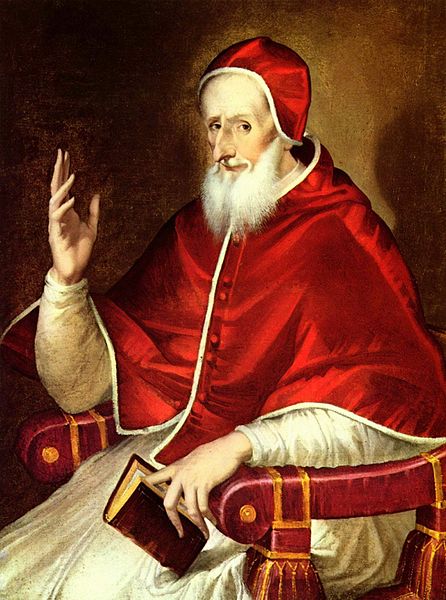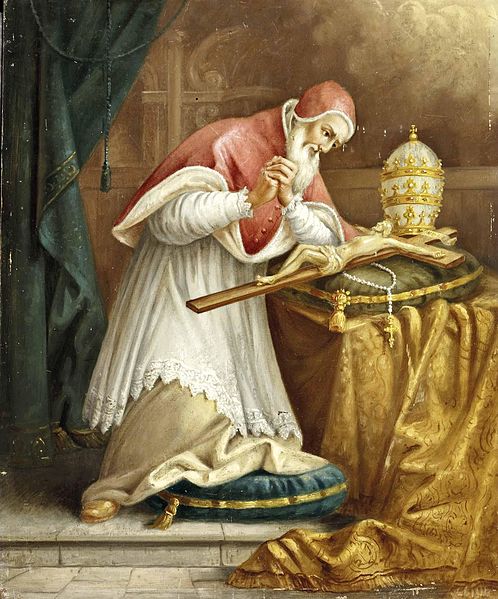Pope Saint Pius V, born Antonio Ghislieri, was ruler of the Papal States and head of the Catholic Church from January 8, 1566 until he passed away on 1572. The venerated saint had little care for titles, or personalities, and was renowned for persecuting 8 French bishops and excommunicating Elizabeth I of England for heresy and persecution of English Catholics. Ghislieri stood against nepotism too, which was displayed after rebuking his predecessor, Pope Pius IV, in person for requesting to subsidize a nephew from the papal treasury and make a 13-year-old member of his family into a cardinal.
He was also the one responsible for assembling the alliance of Catholic states to fight off the Ottoman Empire's advancement in Eastern Europe. In 1571, the Battle of Lepanto took place at the Gulf of Patras, where ships from opposing sides aimed cannons at each other and fired them off. Although the Holy League was outnumbered, they were able to defeat the Ottomans, a victory that Pope Pius V attributed to the intercession of the Blessed Virgin Mary and went ahead to inaugurate the feast of Our Lady of Victory.
Biography
Antonio Ghislieri was born on January 17, 1504 in Bosco in the Duchy of Milan, Italy. By the time he reached the age of 14, he entered the Dominican Order and took on the name Michele. He passed from the monastery of Voghera to that of Vigevano, then to Bologna. Ghislieri was ordained priest in 1528 inside the city of Genoa and was appointed by his order to Pavia, where he conducted sermons and lectured for a total of 16 years. Pope Pius V was able to submit thirty propositions against the Protestant Reformation and in support of the papal chair.
He eventually became master of novices and was chosen prior of more than one Dominican priory on several occasions. Pope Pius V was a reformist and would often be seen traveling on foot without a cloak in deep silence, in a state of penance, fasting and passing the long hours of the evening in prayer and meditation. Ghislieri would also talk to his companions all about God, insisted on discipline and endeavored to cultivate the practice of monastic virtues, during a time of great moral laxity. He was later made Bishop of Sutri by Pope Paul IV and was chosen as inquisitor of the faith in Lombardy and Milan.
Pontificate
Pope Pius V's pontificate witnessed him deal with the spread of Protestant axioms in the West, Turkish armies advancing from the east and with the internal reform of the Church. One of the first things he did was to reduce the cost of the papal court and matched it in the same manner of the Dominican Order to which he previously belonged to. He then followed it up by asserting the liturgy of the Mass in particular, and the ceremonial in general. Compelling residence among the clergy was also one of his tactics to ensure that morality and discipline in Rome shall be restored.
Holy League and the Battle of Lepanto
The Holy League's forming was arranged by Pope Saint Pius V to battle the advancing forces of the Ottoman Empire. The two opposing forces eventually met on October 7, 1571, an encounter in the middle of the sea and be named the "Battle of Lepanto." The combined fleet, under Don John of Austria, of the Holy League won and was able to push the Ottoman Empire back. This event is what led the saint's canonization because he knew the battle was over, even though he was at Rome at the time.
It is reported that when the battle reached its end, Pius stood up and went to a nearby window and gazed towards the East. After a while, he turned around and proclaimed, "The Christian fleet is victorious!" and cried tears of thanksgiving.
He then instituted the Feast of Our Lady of Victory, to honor the victory. Pius V financially aided in the construction of Malta's capital city, Valetta, by sending his military engineer Francesco Laparelli to organize its construction.
Passing and Consecration
Pope Saint Pius V passed away on May 1, 1572 of what is believed to be caused by cancer. Antonin Cloche, Master of the Orders of Preachers, started the process of Pius V's canonization in 1696. He was beatified by Pope Clement X in 1672 and was eventually canonized by Pope Clement XI, on May 22, 1712.
The Saint’s feast day was then inserted in the General Roman Calendar in year 1713 and is celebrated on the 5th of May, with the rank of "Double." But the date was changed on 1969 and was moved to April 30, one day before his death anniversary. Blessed Cardinal John Henry Newman also declared that "St. Pius V was stern and severe, as far as a heart burning and melted with divine love could be so ... Yet such energy and vigor as his were necessary for the times. He was a soldier of Christ in a time of insurrection and rebellion, when in a spiritual sense, martial law was proclaimed.



